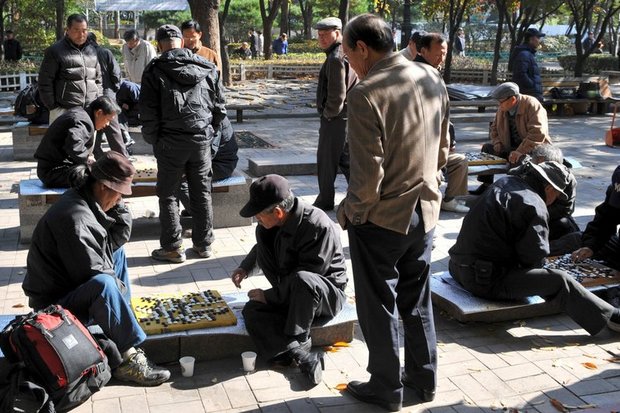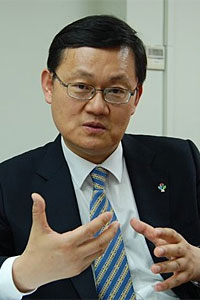
South Korea is facing major demographic challenges. The total fertility rate (the number of children per woman), at 1.24, is one of the lowest in the world, and well below the level -- 2.1 children per woman -- needed to sustain a population without immigration. As a result, the population is aging fast, and the government, despite its best efforts, seems to have no answer.
A low birthrate is common in industrialised countries. Before South Korea's economic boom -- a time when having more children was viewed as a source of security in old age -- the fertility rate was much higher, averaging more than six until 1960. But, as South Korea's economy advanced, child-rearing costs rose, and female labour-force participation increased, the fertility rate declined dramatically, dropping below two in the 1980s.
At first, falling fertility rates were an economic blessing, as households saved more and invested in children's development. In 2015, the college enrollment rate for women hit 81%, compared to just 6% in 1980. But the decline of the prime working-age population has lately been undercutting economic growth, and threatens to place excessive pressure on the public pension system down the road.
South Korea's government has attempted to address these challenges with a series of measures aimed at boosting fertility rates. A recent package includes more paternity leave, priority enrollment in public childcare facilities for third children, and subsidies for infertility treatment.
But whether these measures will lead to higher fertility rates is dubious, for a simple reason: they fail to tackle sufficiently the high economic hurdles that are causing South Koreans to delay or forego having children.
One of those hurdles is the cost of education. South Korean parents are willing to invest heavily in giving their few children the best chance of prospering. In 2015, they spent almost 7% of their disposable income on private tutoring for their children in primary and secondary education. They also pay an absurdly high price for their children's college education, which no longer guarantees prosperity in life. In fact, South Korea's share of private spending for college education is the highest among OECD countries, even ahead of the US. That limits how many children parents may feel they can afford to raise.
For many young South Koreans, even marriage is economically unfeasible nowadays, owing to factors like high housing costs and youth unemployment, even among university graduates. The number of weddings in South Korea plunged from 435,000 in 1996 to 302,800 in 2015. In a country where only 2% of children are born outside marriage, this trend has a powerful impact on fertility rates.
Women confront the highest barriers to increased fertility. Pervasive gender inequality, together with a lack of affordable, high-quality childcare, causes many South Korean women to withdraw from the labour market after marriage or childbirth.
While men work long, inflexible hours, women assume the lion's share of the responsibility for family care. A 2014 survey indicated that South Korean women spent, on average, three hours and 28 minutes daily on household activities and family care, compared to just 47 minutes for men, who also accounted for only 5.6% of those who took parental leave in 2015.
Though new measures aim to boost this share, it will not be enough. Women are not just struggling to cope with uneven parental leave; many are leaving their jobs altogether after childbirth. And many of them do not wish to do so. In a recent survey by the Federation of Korean Industries, 38% of the single female respondents said that they do not want children, mostly fearing that they will struggle to keep up at work or lose their jobs. Only one-third responded positively to the government's programme for promoting fertility.
South Korea must pursue a more comprehensive policy package aimed at lowering some of the barriers to childbirth. Women, in particular, need greater support, in order to eliminate the binary choice between career and family. The key is to provide more flexible work arrangements, to build a more accepting corporate culture, and to ensure accessible childcare, both public and private. To this end, allowing the migration of foreign housekeepers and caregivers could be very helpful.
South Korea remains conservative about offering permanent residency to foreign nationals. But in advanced economies where market services for childcare and households are available, highly educated women tend to have more children, especially at older ages.
Japan, for its part, has managed to boost its ultra-low fertility rate -- which bottomed out in 2005 at 1.26 -- to 1.46 in 2015, through consistent efforts to reduce childrearing costs and change the corporate culture. To sustain this recovery, it has recently decided to take initiatives to attract more foreign housekeepers. These changes reflect Japanese Prime Minister Shinzo Abe's commitment to prevent the population from falling below 100 million.
Even where foreign household workers do not raise the fertility rate, they enable more women to continue working after having children. In Singapore, for example, families often hire live-in maids from neighbouring countries, including the Philippines and Indonesia, to take care of the housework and childcare. Though Singapore's fertility rate stands at just 1.3, this policy enables the country to attract foreign talents to fill the population gap and sustain the economy.
To some extent, demographic change is inevitable, as is its transformative economic impact. But there are steps that governments can take to shape demographic trends and blunt their negative effects. If South Korea creates an environment in which families can live and work happily, those families will grow larger. ©2016 PROJECT SYNDICATE
Lee Jong-wha is professor of economics and director of the Asiatic Research Institute at Korea University.
